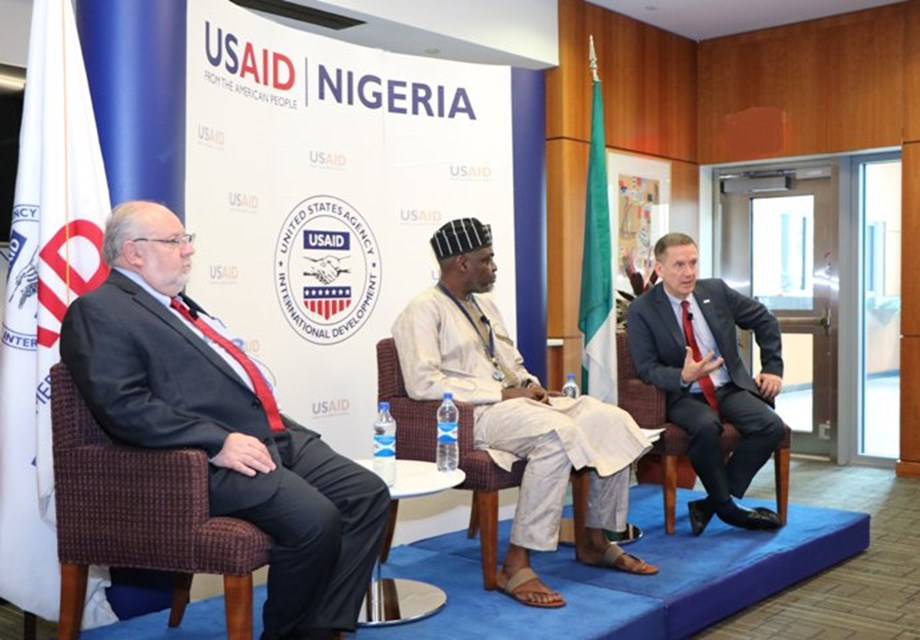ECONOMY & DEVELOPMENT

NIGERIA RECEIVES $876M USAID SUPPORT, RANKS THIRD IN AFRICA
Nigeria has become the third-largest recipient of development assistance from the United States Agency for International Development (USAID) in Africa, securing a total of $876 million in 2024.
This is according to the Africa Sustainable Development Report 2025, jointly published by the African Union Commission, United Nations Economic Commission for Africa, African Development Bank, and the United Nations Development Programme.
The report shows that the Democratic Republic of Congo (DRC) ranked first with $1.3 billion, followed by Ethiopia with $1.25 billion. Nigeria came third, ahead of South Sudan ($830 million), Kenya ($824 million), Mozambique ($756 million), and Sudan ($694 million).
While Nigeria’s allocation ranked among the continent’s largest in absolute terms, it represented only 0.21 percent of its Gross Domestic Product (GDP)—the second-lowest ratio among the top ten beneficiaries. In contrast, South Sudan, which received less in total funding, had the highest aid-to-GDP ratio at 6.05 percent.
Overall, the top ten African recipients collectively received $8.1 billion in USAID assistance in 2024, with the DRC and Ethiopia accounting for a major share.
The report further noted the uneven distribution of development financing across African regions, stating that East and West Africa recorded the largest funding gaps due to the presence of highly populated countries such as Nigeria, Ethiopia, and the DRC. In contrast, North and Southern Africa had smaller Sustainable Development Goal (SDG) financing gaps, reflecting higher development levels and broader fiscal stability.
The 2025 report emphasized that while external aid remains essential, African nations must strengthen domestic resource mobilization and enhance fiscal efficiency to bridge the wide financing gaps hindering progress toward the SDGs.
However, Nigeria’s access to a proposed $602.95 million USAID grant for 2025 became uncertain following a 90-day suspension of all USAID programmes ordered by U.S. President Donald Trump earlier in the year.
The suspension followed an executive order issued upon Trump’s return to office in January 2025, directing a comprehensive review of U.S. foreign assistance to ensure alignment with American national interests and eliminate inefficiencies.
As a result, funding for critical sectors—including health, governance, economic development, and security—has been placed on hold.
According to the proposed USAID budget for 2025, about 89.27 percent of Nigeria’s $602.95 million allocation was designated for health programmes, highlighting the nation’s dependence on U.S. support in the sector.
The largest portion, $368 million, was earmarked for HIV/AIDS initiatives under the Global Health Programme, with $322 million from GHP-State and $46 million from GHP-USAID.
Other allocations included $22 million for tuberculosis, $73 million for malaria control, $33.25 million for maternal and child health, and $22.5 million for family planning and reproductive health.
In comparison, only $2.5 million was budgeted for water supply and sanitation, raising concerns about clean water access in rural communities.
The aid suspension has created uncertainty about the continuity of these initiatives, especially as the U.S. administration re-evaluates its foreign policy direction in Africa.
Also affected is the peace and security sector, which was expected to receive $7.6 million aimed at strengthening Nigeria’s security framework. The breakdown included $2.8 million for conflict mitigation, $1 million for military partnerships, and $3.05 million for citizen security and law enforcement.
These allocations reflected the U.S. government’s commitment to supporting Nigeria in combating insurgency and terrorism threats from Boko Haram and the Islamic State – West Africa Province (ISWAP) in the North-East.
However, with the funding review ongoing, analysts fear potential cuts could undermine Nigeria’s counterterrorism capacity.
The economic growth sector was also set to receive $39.6 million, the largest share outside health. Of this, $29.1 million was allocated to agriculture, $1.5 million to private sector productivity, and $5 million to clean energy initiatives—signaling a shift towards economic sustainability and private sector-led growth over direct humanitarian relief.
In response to the funding freeze, the Nigerian government has approved $200 million in emergency intervention funds to sustain key healthcare operations.
The Federal Ministry of Finance confirmed that the funds would support vaccine procurement, antiretroviral distribution, and maternal health services to mitigate disruptions in critical programmes.
Additionally, the Coordinating Minister of Health and Social Welfare, Professor Ali Pate, announced plans to engage 28,000 health workers who were previously funded under USAID projects.
Pate reaffirmed the government’s commitment to taking ownership of the nation’s healthcare system in line with the evolving U.S. foreign aid policy.
"This represents a significant development in our ongoing coverage of current events."— Editorial Board









